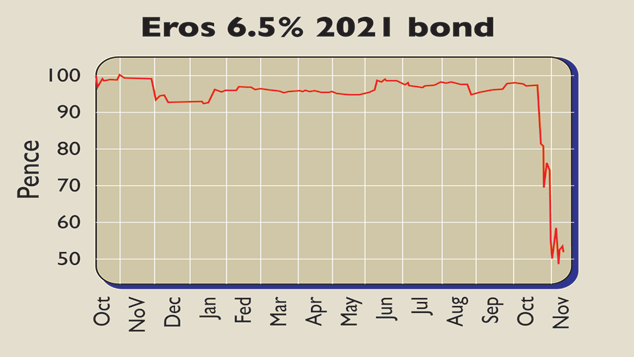
“The biggest retail bond crash in the market’s history has quietly taken place,” says Kyle Caldwell in The Daily Telegraph. A London-listed bond issued by Eros International, an Indian film production and distribution company, has slumped by more than 50% in three weeks, the worst performance of any security since the launch of the London Stock Exchange’s order book for retail bonds (ORB) five years ago. Coming on the heels of sharp drops in bonds issued by oil explorers Enquest and Premier Oil, the crash should be a salutary reminder that some retail bonds are riskier than investors believe.
Retail bonds have proved very popular as low interest rates on banks accounts have forced investors to look for other sources of income. Essentially, a retail bond involves a company borrowing money and paying a fixed rate of interest in return (usually paid either once or twice per year). At a set time in the future, known as the maturity date, the company repays the initial investment. They are similar to a traditional corporate bond, with the main difference being that the minimum deal size on ORB is far smaller than the main corporate bond market, making it more accessible for individual investors.
When a retail bond first launches, it is priced at 100p. Thereafter, the bond can be bought and sold on ORB at a price that fluctuates depending on market demand. This means that if you want to get your money back before maturity, you can do so by selling the bond – but you are not guaranteed to get the full 100p (you may make a loss or a profit depending on how the price of the bond has performed).
In addition, there is the risk that the issuer will get into trouble and not be able to meet its obligations – that is, it will not pay the interest due or repay the capital at maturity. If this happens, there is no protection from the UK Financial Services Compensation Scheme (FSCS). Investors will simply get what can be recovered from the company after it goes bust. This is very different to the situation with deposits in a bank, where the FSCS will pay compensation of up to £85,000 (falling to £75,000 in January next year) per individual per institution if a bank goes bust and you don’t get your money back.
So bonds are not a substitute for savings accounts – they are far, far riskier. Investors need to be realistic about whether the yields being offered reflect the potential risks, which was probably not the case with Eros (see below). What’s more, they should only be held as part of a diversified portfolio – putting a large amount of your savings into a single retail bond means you are too exposed to the risk of the issuer failing.
Consequently, investors should consider opting for a corporate bond fund instead of buying retail bonds, because a fund provides instant diversification. That said, corporate bonds in general aren’t attractive at present. If central banks start raising rates and returns on savings accounts improve, people who have reluctantly bought bonds for higher yields may rush back into cash. That could push down bond prices and leave investors sitting on losses. Meanwhile, higher rates could lead to rising defaults among riskier borrowers. So in MoneyWeek’s view, sticking to cash is a better choice. Interest on savings accounts may be pitifully low, but at least your capital is safe.
What’s gone wrong with Eros?
Eros International launched its retail bond in September 2014, with an interest rate of 6.5% and a maturity date of 2021. Although the bond raised £50m, there were some signs of hesitation among investors from the outset: while most ORB issues trade above par (the price at which they will be redeemed), the Eros bond only briefly rose above 100p. Nonetheless, the price was relatively steady and, as recently as mid-October, still stood at 97p.
Trouble began with claims about problems with Eros’s financials on social media and blogs. The price of Eros’s shares, which are listed in New York, began dropping sharply in mid October. A week later, the price of the ORB-listed bond began to slide. Subsequently, Wells Fargo equity analyst Eric Katz also raised questions about Eros’s revenue and lowered his rating on the stock on 23 October. This seems to have triggered a further slide in both bonds and equities. Today, the bond trades at under 50p (having fallen as low as 35p on 2 November).
Eros’s bondholders now face a dilemma: selling out and accepting a substantial loss or holding on and risking things getting worse. At this stage, it’s impossible to determine whether the allegations against Eros have any substance (the company has vigorously denied them and said there is a “vicious campaign” against it by shortsellers). However, it is clear that the initial yield of 6.5% offered by this bond did not reflect the risks of lending to a relatively small company (reported revenue in the most recent year was $284m) based outside the UK. Investors should heed the lesson and tread carefully with other bonds.